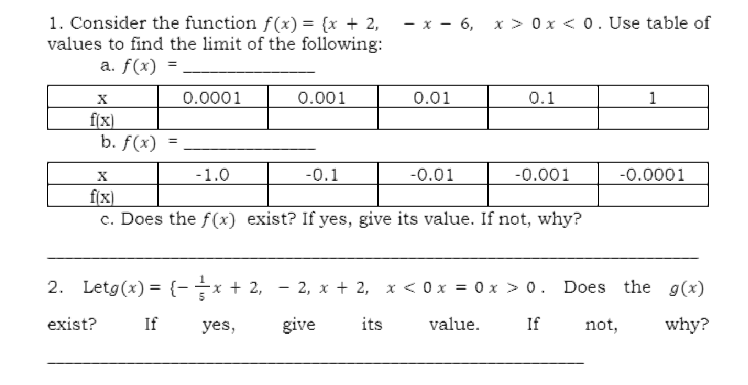1. Consider the function f(x) = {x + 2, values to find the limit of the following: - x - 6, x > 0 x < 0. Use table of a. f(x) = . 0.0001 0.001 0.01 0.1 1 f(x) b. f(x) -1.0 -0.1 -0.01 -0.001 -0.0001 f(x) c. Does the f(x) exist? If yes, give its value. If not, why? 2. Letg(x) = {-x + 2, - 2, x + 2, x < 0 x = 0 x > 0. Does the g(x) exist? If yes, give its value. If not, why?
1. Consider the function f(x) = {x + 2, values to find the limit of the following: - x - 6, x > 0 x < 0. Use table of a. f(x) = . 0.0001 0.001 0.01 0.1 1 f(x) b. f(x) -1.0 -0.1 -0.01 -0.001 -0.0001 f(x) c. Does the f(x) exist? If yes, give its value. If not, why? 2. Letg(x) = {-x + 2, - 2, x + 2, x < 0 x = 0 x > 0. Does the g(x) exist? If yes, give its value. If not, why?
Chapter3: Functions
Section3.3: Rates Of Change And Behavior Of Graphs
Problem 2SE: If a functionfis increasing on (a,b) and decreasing on (b,c) , then what can be said about the local...
Related questions
Question

Transcribed Image Text:1. Consider the function f(x) = {x + 2,
values to find the limit of the following:
- x - 6, x > 0 x < 0. Use table of
a. f(x) = .
0.0001
0.001
0.01
0.1
1
f(x)
b. f(x)
-1.0
-0.1
-0.01
-0.001
-0.0001
f(x)
c. Does the f(x) exist? If yes, give its value. If not, why?
2. Letg(x) = {-x + 2, - 2, x + 2, x < 0 x = 0 x > 0. Does the g(x)
exist?
If
yes,
give
its
value.
If
not,
why?
Expert Solution
This question has been solved!
Explore an expertly crafted, step-by-step solution for a thorough understanding of key concepts.
Step by step
Solved in 2 steps with 2 images

Recommended textbooks for you


College Algebra (MindTap Course List)
Algebra
ISBN:
9781305652231
Author:
R. David Gustafson, Jeff Hughes
Publisher:
Cengage Learning


College Algebra (MindTap Course List)
Algebra
ISBN:
9781305652231
Author:
R. David Gustafson, Jeff Hughes
Publisher:
Cengage Learning